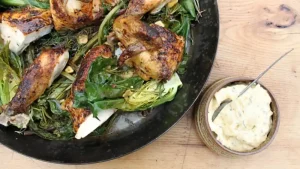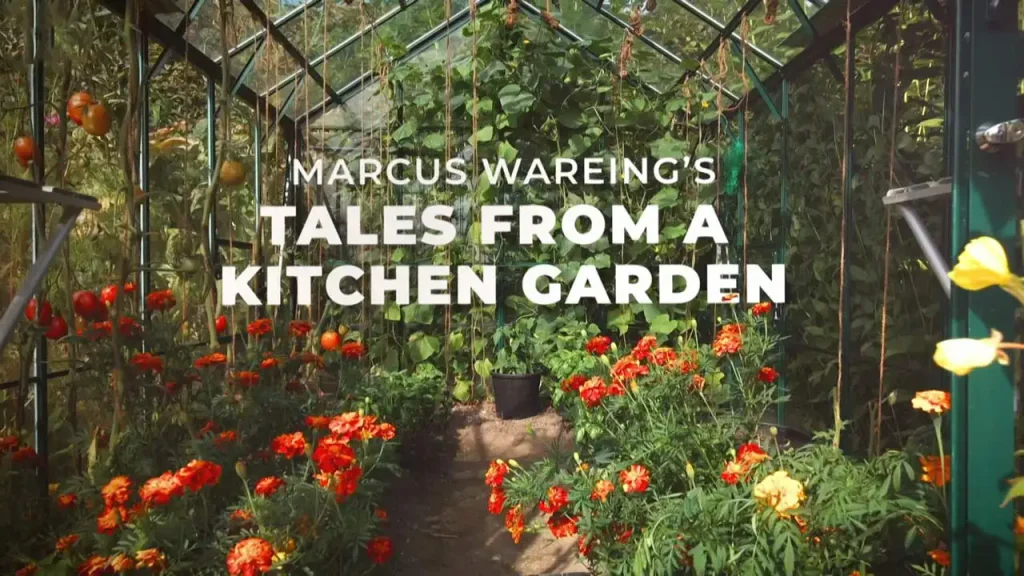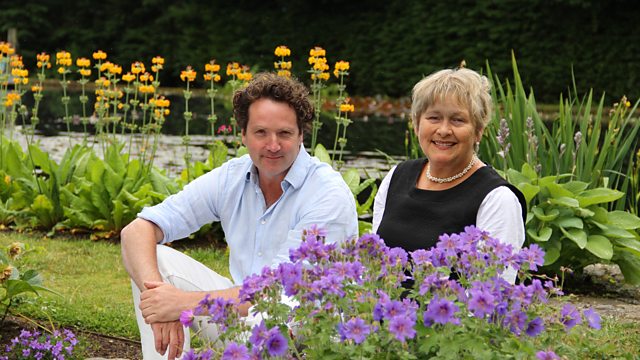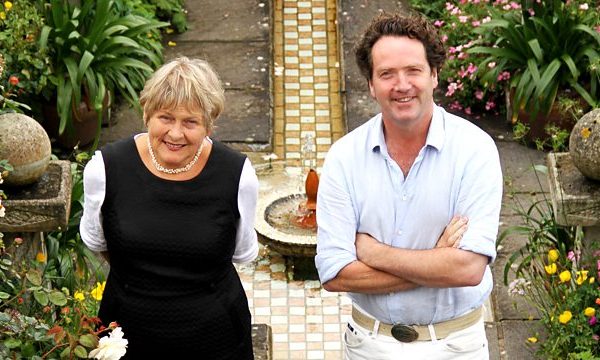Marcus Wareing’s Tales from a Kitchen Garden 2023 Episode 12 – On his idyllic Sussex smallholding, renowned chef Marcus Wareing continuously seeks to uncover new and exciting possibilities. Today’s adventure presents him with a rather playful challenge – his mischievous pigs. Despite being securely fenced off within the lush woodland, these spirited animals are causing quite a stir, keeping Marcus on his toes. Turning his attention to another farm section, Marcus embarks on a meticulous health check for his cherished chickens. His friendly neighbor Zoe, always eager to lend a hand, joins him in ensuring the birds are in prime condition. Recognizing the potential for growth and variety within his brood, Marcus contemplates adding more members to his collection of hens.
Drawn by local reputation, he pays a visit to the egg farm owned by the dedicated Susie. There, he is captivated by her vast flock of 12,000 organically raised hens. He learns an intriguing fact – the size of the eggs these hens lay is directly proportional to their body weight. With his inquisitive nature piqued Marcus expresses interest in adopting two of Susie’s older, yet equally charming, chickens. Returning to his homestead, Marcus, along with the skilled gardener Anatoliy, gets to work. They are diligently preparing the chicken coop, ensuring it’s ready and welcoming for its soon-to-be residents. Amidst the preparation, Marcus, with his culinary prowess, decides to whip up a delightful batch of lemon curd, an egg-based preserve that ranks high on his list of favorites.
But Marcus’s farming curiosity isn’t limited to animals alone. Eager to diversify his agricultural pursuits, he considers introducing wheat as a new crop. This leads him to a friendly visit to his neighbor and fellow smallholder Paul’s domain, where he gains insights into the traditional methods of growing and harvesting wheat.
Finally, back on his farm, the atmosphere is one of anticipation and warmth. The two adopted chickens make their grand entrance and begin acclimatizing to their newly adopted residence. Marcus, being the exemplary host, prepares a delectable spit roast chicken, seasoned to perfection, as a special treat for his dear friends Zoe and Susie. The day culminates in joy, camaraderie, and culinary delights.
Marcus Wareing’s Tales from a Kitchen Garden 2023 Episode 12
Exploring New Possibilities on the Sussex Smallholding
Marcus Wareing has big plans for his Sussex smallholding this year. Like any farmer, he has learned to expect the unexpected when it comes to raising livestock and growing crops. This week, Marcus deals with some troublemaking pigs, gives his chickens a checkup, and expands his flock. He also gets tips on growing wheat from his neighbor Paul. Along the way, Marcus experiments with cooking from the farm, including a lemon curd recipe and spit roast chicken. Join him on this tasty adventure!
Dealing with Naughty Pigs in the Woodland Pen
Raising pigs has been an exciting new endeavor for Marcus, but it hasn’t been without challenges. The pigs have already escaped their pen once before, rooting up parts of the smallholding in the process. This time around, Marcus chose to fence off a section of woodland for the pigs’ home, hoping they would enjoy foraging among the trees.
Unfortunately, the pigs have started causing trouble again, breaking down the fence and escaping into the neighbor’s orchard. Marcus repairs the fence with stronger wooden posts and uses an electric line as extra reinforcement. He knows happy pigs are best kept occupied, so Marcus brings in new enrichment items like footballs, bundles of hay, and pinecones soaked in vegetable broth for the pigs to play with.
With high energy levels, pigs need plenty of space to root, dig, and run around. Marcus may need a larger penned area in the future. For now, he is keeping a close eye on the pigs to ensure they stay securely in their fenced woodland home. The last thing Marcus wants is more damage or neighborly disputes!
Chicken Health Checks and Expanding the Flock
Chicken care has become a regular routine on the smallholding. Today Marcus carries out health checks on his current flock, looking for any signs of illness or issues. Happily, the chickens seem very healthy and energetic. Chicken health is so important, as illness can spread quickly in flocks. Marcus makes sure the coop is clean and dry, and that the chickens have access to clean water and plenty of layers mash feed to supplement what they forage.
To help maintain the health of the flock, Marcus invites his neighbor Zoe over to check for parasites. They carefully examine each hen, checking for mites and lice. Zoe shows Marcus how to humanely get rid of any pests. A few of the chickens could use a dusting of diatomaceous earth powder to deter mites.
With the flock in good shape, Marcus decides it’s time to expand and adopt some mature hens. He wants chickens at different life stages to ensure a steady supply of eggs. Marcus visits local farmer Susie, who has an organic egg operation with 12,000 hens. Susie agrees that two of her older chickens would have a happy retirement on Marcus’ smallholding.
Learning How Hen Size Determines Egg Size
Seeing the sheer size of Susie’s pasture-raised flock makes Marcus realize he still has a lot to learn about chicken farming. Susie gives him a lesson in how hen size determines the size of eggs they lay. On her farm, each age group of chickens is segregated into pens and specialized diets customized to their stage of development. This helps standardize egg sizes for the market.
The youngest pullets eat starter feed rich in protein to promote early growth. Once the hens start laying at around 18 weeks, they switch to grower feed. At peak production, the chickens eat layer feed optimized for egg production. Free access to grass and insects helps keep the hens healthy.
Older hens nearing the end of their commercial productivity produce smaller eggs, so are separated and fed differently. Marcus is fascinated by how Susie fine-tunes everything on the farm to maximize production. He realizes there is both art and science to raising chickens for quality eggs.
Preparing the Chicken Coop for New Arrivals
Back at his own farm, Marcus does some reorganization to prepare the chicken coop for the two new arrivals. He cleans the coop thoroughly and lays down fresh pine shavings. The nesting boxes are stuffed with clean hay. Anatoliy helps set up a secondary fenced area attached to the coop where the new hens can adjust before integrating with the flock.
Marcus hangs up a treat ball packed with grains, lettuce, and mealworms in the secondary pen to occupy the newcomers. He also sets up roosting bars at different heights for the chickens. Establishing a proper pecking order will be important when combining the flocks. Marcus puts up shade sails over part of the run and sprinkles diatomaceous earth to deter parasites.
With attention to introducing the new chickens slowly, Marcus is excited to see how they will integrate into the existing flock. Their first few days will be a crucial adjustment period. Marcus wants to give the mature hens every chance to succeed in their new home. Their egg laying days may be numbered, but they still have lots of charm to contribute!
Making Egg-Cellent Lemon Curd from the Farm’s Eggs
With a bumper crop of eggs from the chickens right now, Marcus has been experimenting with different egg-based recipes. Lemon curd quickly became one of his favorites to make. It takes just a few simple ingredients: farm fresh eggs, butter, sugar, lemons, and a dash of salt. Marcus loves how it comes together quickly on the stove into a lush, velvety spread.
Lemon curd is a classic British spread that pairs perfectly with scones, toast, or just eaten straight off the spoon! Marcus enjoys the intense lemony flavor and rich creamy texture. Making it from scratch is satisfying, as most supermarket versions contain artificial colors and flavors. The fresh eggs give it an amazing depth of flavor. Marcus also appreciates using up egg yolks, as many recipes only call for whites.
Once it cools, Marcus transfers the curd to sterilized jars for longer shelf life. He made sure to fully sterilize the jars by simmering them in a big pot of water first. Now he has lemony goodness on hand to enjoy for weeks and share with friends. A little goes a long way due to the intense flavor. Marcus may try experimenting with other citrus curds next, like lime or grapefruit.
Visiting Neighbor Paul to Learn About Growing Wheat
In addition to expanding his livestock, Marcus is eager to try growing some new crops on his land this year. Wheat in particular seems like a worthwhile challenge. Rather than tackle it alone as a newbie, he decides to visit neighbor Paul to learn from his experience. Paul has grown wheat on his property for years using traditional methods.
They start off discussing the timing and site selection considerations for planting wheat. Because wheat is prone to fungal diseases in damp conditions, well-draining soil is ideal. Paul recommends planting in October or November so the young wheat crop can establish before winter. The onset of colder weather triggers the plants to start maturing their seeds.
In terms of tools, Paul describes how a combine harvester is needed for large farms to harvest acres of wheat efficiently. For Marcus’ small plot, they can use old-fashioned handheld sickles when the wheat is ready for harvest around August. Paul demonstrates how to swing the sickle low to the ground to cut each bundle of wheat stalks.
After harvesting comes threshing, where the wheat grains are separated from the chaff. Paul lets Marcus try using a threshing flail to beat the wheat bundles. Finally, they winnow the threshed wheat by tossing it in baskets to let the breeze blow away the chaff. Marcus loved seeing the full traditional process firsthand. He can’t wait to try growing wheat using Paul’s guidance. Over a cold beer, they chat more about the meticulous craft of farming.
Settling the New Chickens into the Flock
The two new heritage breed chickens from Susie’s farm arrive in style in a custom chicken crate. Marcus carries their crate into the secondary pen attached to the main coop so they can have some time to adjust. Right away the chickens seem lively and curious in their new surroundings. Within the first day, they have already sampled the treats in the treat ball and made use of the roosting bars.
Marcus takes time over the next week to sit with the chickens so they get comfortable with his presence. After about five days, he decides to open up the dividing gate between the main coop area and the secondary pen. As expected, there is some ruffling of feathers and jostling to establish dominance, but no major conflicts.
Within their first two weeks, the new chickens have fully integrated into the flock. Their egg production is still going strong, and they seem to enjoy pecking around the vegetable garden for bugs and weeds after the young chickens have been put to bed. Marcus is thrilled the elderly hens are adapting so well. Their unique feathers and personalities add diversity to the flock. Expanding the chicken family was a big success!
Roast chicken, smoked garlic mayo and charred garden greens

Indulge in a flavorful twist to your traditional meals with our spiced, slow-roasted chicken that’s perfectly cooked on the barbecue. Paired with a smoky homemade mayo and an array of fresh vegetables, this dish offers a delightful summer alternative to the age-old classic Sunday roast. To master this recipe, ensure you have a barbecue equipped with a rotisserie grill or a spacious barbecue basket that can comfortably accommodate a whole chicken. Elevate your summer dining experience with this enticing meal.
Ingredients:
For the smoked garlic mayo
- 2 large garlic bulbs
- 2 large egg yolks
- 1 lemon, juice only
- 1 tbsp Dijon mustard
- 300ml/½ pint vegetable oil
- small handful of garden herbs
For the spiced chicken
- 1 tsp ground cumin
- 1 tsp dried chilli flakes
- 1 tsp dried oregano
- 1 tsp smoked paprika
- ½ tsp garlic powder
- 2 tsp sea salt
- 1 tbsp soft brown sugar
- 1 lime, zest only
- 1 free-range chicken (about 1.5kg/3lb 5oz)
- 1 lemon, sliced
- bunch garden herbs
- olive oil
For the charred garden greens
- 800g/1lb 12oz mixed seasonal greens (such as cavolo nero and purple sprouting broccoli)
- 2 tbsp olive oil
- 1 tbsp sea salt
- 1 lemon, juice only
- roasted garlic
- handful garden herbs
- Salt and freshly ground pepper
Method:
- To make the smoked garlic mayo, place the garlic bulbs onto a lit barbecue on an indirect heat and leave to smoke and soften. This will take around 2 hours when you are cooking on the barbecue. Alternatively, preheat the oven to 180C/160C Fan/Gas 4 and wrap the garlic in kitchen foil. Roast for 30 minutes or until soft when squeezed. Once soft and sticky, squeeze the garlic from its papery skins and set aside.
- Put the yolks, lemon juice, mustard, and a pinch of salt in a blender. With the blender on the slowest setting, slowly add the oil in a thin stream. If it begins to thicken too much, add a little more lemon juice. Repeat this process until all the oil is blended in and the mixture has emulsified. Finely chop the roasted garlic and herbs and add to the mayonnaise. Season to taste.
- For the spiced chicken, first make a rub. Grind together the dried spices, garlic powder, and salt to a fine powder in a pestle and mortar. Stir in the sugar and lime zest and set aside.
- Place the chicken on a tray or plate. Stuff the cavity with lemon slices and herbs. Drizzle the skin with olive oil and rub the spice mix all over the chicken until fully coated.
- Put the chicken in a barbecue-safe basket or on skewers. Hang about 30cm/12in above the coals and cook gently for 2 hours. The chicken is cooked through when the juices run clear with no trace of pink when the thickest part of the leg, between the drumstick and the thigh, is pierced with a skewer.
- When the chicken is cooked through, let it rest for 10 minutes before carving.
- To make the charred greens, prepare and wash your chosen greens. Drizzle with olive oil and place directly onto the hot griddle for a few minutes until charred. Place the greens into a large lidded pan, add the salt, lemon juice, garlic, and herbs along with a splash of water. Cover and place on the barbecue to cook through until tender.
- Once the greens are cooked, place on a large serving dish with the portions of chicken on top. Serve with the smoked garlic mayonnaise.
Key Takeaways from Marcus’ Farming Adventures
- Raising livestock like pigs and chickens brings surprises and challenges, but Marcus has embraced the experience. He continues fine-tuning their housing and care.
- Monitoring chicken health and introducing new birds to the flock must be done with care to avoid problems. Every smallholder needs to be proactive about biosecurity.
- Learning from other local farmers like Susie and Paul has been invaluable. Their firsthand knowledge helps Marcus enrich his smallholding.
- Cooking farm-fresh eggs inspires Marcus to experiment more with the kitchen garden’s bounty. He loves putting his own spin on classic recipes.
- Wheat growth needs the right soil and climate conditions, but harvesting it using traditional tools brings history alive. Marcus looks forward to honing his farming craft.
Frequently Asked Questions
What is Marcus Wareing’s net worth?
Marcus Wareing has an estimated net worth of around £5 million. Much of his wealth has come from his successful career as a Michelin-star chef and restaurateur. He runs several prestigious restaurants in London. Marcus has also earned income from cookbooks, brand partnerships, and television shows like MasterChef.
What is the weather like in Sussex today?
The weather in Sussex today is mild, with partly cloudy skies and temperatures around 13°C (55°F). Winds are light from the southwest. The forecast shows no rain expected, with low chances of precipitation through the rest of the week. Typical for September, conditions are cool but pleasant.
What do pigs eat?
Pigs are omnivores and eat a diverse diet. On farms, the main component of pig feed is corn supplemented with soybean meal for extra protein. Pigs also need vitamins and minerals in their diet provided by supplements. Free-range pigs will forage for roots, grass, nuts, fruits, fungi, and invertebrates. Pigs love treats like table scraps but overfeeding leads to obesity.
How many chickens do you need to start a backyard flock?
Many experts recommend starting with at least 3-5 chickens for a healthy backyard flock. Chickens are social animals that tend to do better in small groups. Three is the minimum, but five provides a good dynamic and minimizes bullying. Space requirements vary based on the breed and pen size, but a basic rule is 5-10 square feet per chicken inside the coop.
What is Susie’s egg farm called?
Susie’s organic free-range egg farm does not seem to be given an official name in the content provided. However, based on the details, we can imagine Susie’s farm likely has a quaint name evoking the pastoral beauty of the Sussex countryside like “Susie’s Meadow Farm” or “Susie’s Forest Egg Farm”. Feel free to envision your own suitable name for Susie’s idyllic egg operation!




